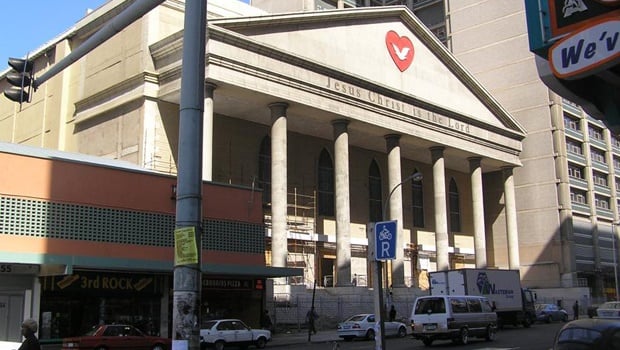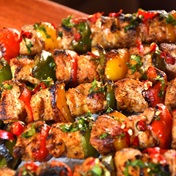
‘The [church] sector has been left alone for too long,” says Thoko Mkhwanazi-Xaluva. “And knowing what we know now, we can clearly say that it is very bad.”
She is speaking as the chairperson of the Commission for the Promotion and Protection of Cultural, Religious and Linguistic Communities (the CRL Rights Commission), which is completing its investigative study launched in October last year. The study seeks to understand the issues of church commercialisation, governance structures within the church and the cause of the controversial behaviour “we are seeing in religious practice in our country”. The commission has looked at a range of religions, including Judaism, Islam, Hinduism, Bahá’í, African traditional churches and Rastafari, but Mkhwanazi-Xaluva is referring to the likes of Pastor Lesego Daniel, whose congregants ate grass and drank petrol, and Pastor Penuel Mnguni, who urged the faithful to eat live snakes. What concerns the commission is that the behaviour seems to be part of a new kind of spectacle.
“I think the trend is because pastors are trying to outdo one another. The concern is that it becomes more and more bizarre, and we are worried it might lead to serious injury or death. However, the very same people we are worried about, whose dignity we think is being infringed upon, are marching to the commission and asking why we want to close their churches.”
She says recourse is made harder by the lack of regulation of the sector.
Why are charismatic churches so big in South Africa?
Mkhwanazi-Xaluva notes that there has been a discernable shift away from traditional churches. Dr Illana van Wyk, an anthropologist and researcher at the Institute for Humanities in Africa at the University of Cape Town, spent many years researching her book, A Church of Strangers: The Universal Church of the Kingdom of God in South Africa. She told #Trending that “Pentecostalism has a long history in South Africa. It started in 1904 in the US, and, by 1908, there were churches here and they became huge, because people embraced the gifts of the Holy Spirit and the departure from traditional forms of Pentecostalism.”
So charismatic churches are nothing new. Van Wyk also clarifies that the “charisma” in charismatic churches doesn’t refer to the pastor, but to the inculcation of the Holy Spirit’s gifts demonstrated at Pentecost Sunday.
Says Mkhwanazi-Xaluva: “We have noticed that people starting up churches are getting younger – some pastors are now 23, 24, 25, whereas before, pastors took a long time before they could be head of the church. Now anyone can do it ... You just need to say you’ve had the calling...”
Van Wyk offers an explanation: “Because the main tenet of Pentecostalism and, by extension, charismatic churches, is that it is the individual’s responsibility to read and understand the teachings of the Bible for yourself, to further your relationship with God ... this means you can also disagree with your pastor. This focus on the individual means there have been lots of schisms within the religion as people leave their churches and start their own, with their own understandings of the teachings they have read.”
The focus on individual meditation also means, for example, Pastor Chris’ Christ Embassy has a book called Rhapsody Of Realities that offers followers a daily scripture to meditate on, which now also has an app.
The lack of regulation, says Mkhwanazi-Xaluva, means some churches have been able to function like private businesses with the tax benefits of not-for-profit organisations. The commission’s deputy chair, Professor David Mosoma, said earlier this month: “For each and every person who does not have employment, the first port of call is to start a church. People of this country believe. If you say ‘God has said’, they will follow you. So, because of that vulnerability, people exploit it for financial gain ... Churches have become more like business. Some, when you walk in, there are ATMs or speed points. Your devotion is measured by how much you give and it creates your status more than your faith.”
Van Wyk, however, says that, as noble as the commission’s work is, “all they see is the money. And my argument is that you must take seriously the claim that people in charismatic churches are fighting a spiritual battle every day. You must take seriously the claim that to achieve individual ‘blessings’, congregants have to make regular and significant financial contributions to the church, which are believed to then make the Almighty return the favour by way of good fortune. Because, if we take the claims seriously, it means we can understand with empathy why people take on the challenges they do, which are taken on as proof of their position in the world, and to show Satan – who can take the form of illness, poverty, unemployment, whatever – that they are strong. You cannot dismiss it as hocus-pocus, because how else do you explain the significant move to charismatic churches?”
To meet demand, some churches, such as the Universal Church of the Kingdom of God, have services up to six times every day, with 156 churches in Gauteng alone.
However, there remain real issues. Mkhwanazi-Xaluva says that for “even those churches that do register with the department of social development, there is very low compliance. The department tells us that 76% of the churches registered with them do not submit their financial statements annually. Some churches bank with accounts that are in a pastor’s name and so the pastors get to decide what happens to the money. Many of the newer churches don’t have clear governance structures, so I open a church and I am answerable to no one but myself and God. So you can make people do what you want; you can sell water at a premium because you have prayed over it...”
On the matter of money and wealth in charismatic churches, van Wyk believes there are further misunderstandings: “The idea of prosperity in charismatic churches in essence speaks to one’s right to wealth, and wealth doesn’t just refer to money, but [also to] health, joy, relationships ... And, more critically, why we aren’t wealthy and how that relates to demons or the spiritual battleground that the world is and what you have chosen in the daily battle.”
The commission hopes to present its findings to Parliament at the end of April, along with recommendations on how best to regulate the sector.
“We want to incorporate a system of self-regulation, but also to allow people to have legal recourse if they need it ... to lodge a complaint of grievance. We’ve seen how self-regulation can fail with the sex-abuse scandals within the Catholic Church, which failed to protect those children,” says Mkhwanazi-Xaluva. The difficulty will be in the implementation, and whether pastors and congregants will allow the law into their churches.
In the meantime, churches continue to mushroom, and the significance and importance of charismatic churches, in addition to the numbers of congregants and zeros in the bank, are also evidenced by President Jacob Zuma breaking with a decades-long tradition (observed even by apartheid presidents) of addressing the Zion Christian Church, one of the biggest independent churches in Africa, in Moria.
Instead, in 2014, he opted to address the well-attended Universal Church of the Kingdom of God’s Easter celebration at Ellis Park.
A Church of Strangers: The Universal Church of the Kingdom of God in South Africa by Illana van Wyk is published by Wits University Press and sells for R320




 Publications
Publications
 Partners
Partners








